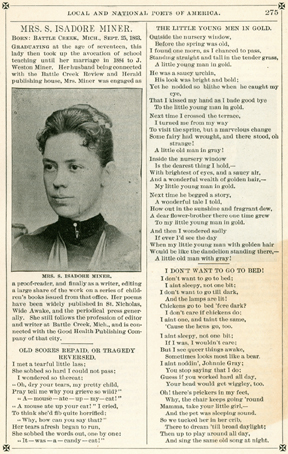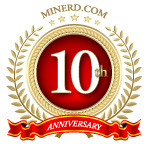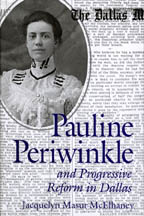| Home |

|
|
|
Photo
of the Month |

 |
One of the more unusual stories Minerd.com tracks belongs to Sara "Isadore" (Sutherland) Miner (1863-1916), a talented Michigan journalist whose original pen name was "Mrs. S. Isadore Miner." After separating from her husband and going to Texas, she became a pioneering newspaper reporter, reformer and columnist under the new pen name of "Pauline Periwinkle." Isadore's accomplishments were so influential that more than a century later, in 1998, she was featured in a full-length biography, Pauline Periwinkle and Progressive Reform in Dallas, by Jacquelyn Masur McElhaney, and is mentioned in many other books.
 |
While married to her first husband, Dr. James "Weston" Miner of Battle Creek, Michigan, Isadore honed her craft writing for church journals. She also edited publications for John Harvey Kellogg, creator of the famed Battle Creek Sanitarium and later a co-founder of the Kellogg Food Company. In one indication of her talent, her photograph was published with three of her poems in Thomas W. Herringshaw's 1890 book Local and National Poets of America. (Ironically, she was one of three Minerd- Minard- Miner- Minor cousins whose works are found in the volume.)
After arriving in Dallas in 1893, and divorcing Miner, Isadore reinvented her life completely as a "writer, social welfare worker and club woman," said the Dallas Morning News. Under her new pen name "Pauline Periwinkle," she authored a regular column encouraging women to become involved in societal reforms. Among her most lasting achievements was a collaboration with other civic leaders to attract Pittsburgh industrialist and philanthropist Andrew Carnegie to donate funds for a Carnegie Public Library in Dallas.
During her 23 years in Dallas, Isadore married again, to William A. Callaway, and was a member of the Texas Woman's Press Association, Texas Equal Rights Association and Woman's Congress. The book Prominent Women of Texas states that Isadore was the "only woman in Texas who has ever been honored by a temporary seat in the presidential chair of an assembly composed exclusively of men... The Texas Press Association was the source of this compliment, and her reading of an appreciated paper before that body was the occasion."
|
Copyright © 2009-2010 Mark A. Miner |
|
Page from Local and National Poets of America, by Thomas W. Herringshaw (Chicago: American Publishers Association, 1890.) Cover of Pauline Periwinkle courtesy of Texas A&M University Press. |